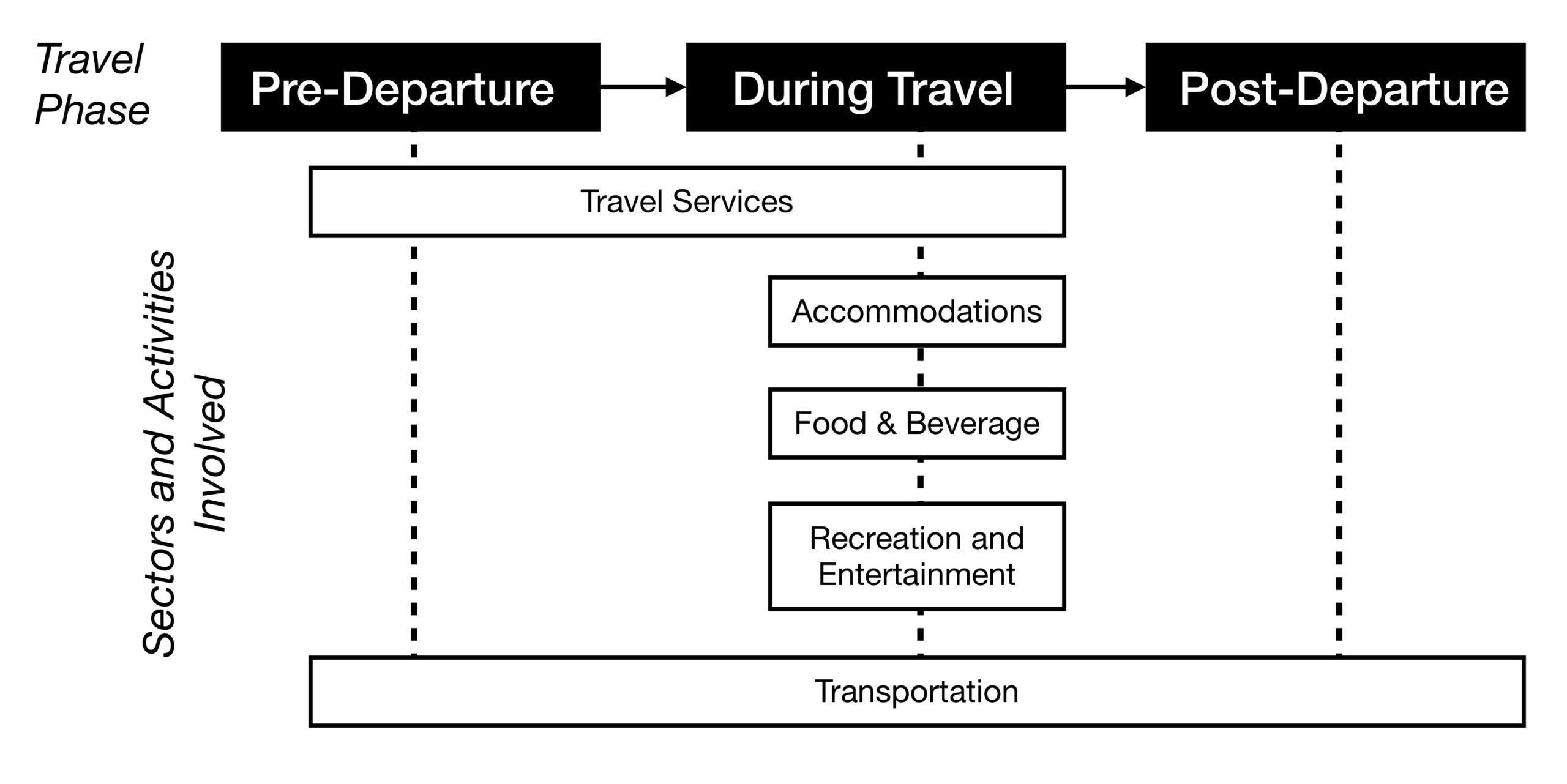The magazine of Glion Institute of Higher Education
- What is tourism and hospitality?

Tourism and hospitality are thriving industries encompassing many sectors, including hotels, restaurants, travel, events, and entertainment.
It’s an exciting and dynamic area, constantly evolving and adapting to changing customer demands and trends.
The tourism and hospitality industry offers a diverse range of career opportunities that cater to various interests, skills, and qualifications, with positions available from entry-level to executive management.
The booming tourism and hospitality industry also offers job security and career growth potential in many hospitality-related occupations.

What is tourism?
Tourism is traveling for leisure, pleasure, or business purposes and visiting various destinations, such as cities, countries, natural attractions, historical sites, and cultural events, to experience new cultures, activities, and environments.
Tourism can take many forms, including domestic, or traveling within your country, and international tourism, or visiting foreign countries.
It can also involve sightseeing, adventure tourism , eco-tourism, cultural tourism, and business tourism, and it’s a huge contributor to the global economy, generating jobs and income in many countries.
It involves many businesses, including airlines, hotels, restaurants, travel agencies, tour operators, and transportation companies.
What is hospitality?
Hospitality includes a range of businesses, such as hotels, restaurants, bars, resorts, cruise ships, theme parks, and other service-oriented businesses that provide accommodations, food, and beverages.
Hospitality is all about creating a welcoming and comfortable environment for guests and meeting their needs.
Quality hospitality means providing excellent customer service, anticipating guests’ needs, and ensuring comfort and satisfaction. The hospitality industry is essential to tourism as both industries often work closely together.
What is the difference between tourism and hospitality?
Hospitality and tourism are both related and separate industries. For instance, airline travel is considered as part of both the tourism and hospitality industries.
Hospitality is a component of the tourism industry, as it provides services and amenities to tourists. However, tourism is a broader industry encompassing various sectors, including transportation, accommodation, and attractions.
Transform your outlook for a successful career as a leader in hospitality management
This inspiring Bachelor’s in hospitality management gives you the knowledge, skills, and practical experience to take charge and run a business

Is tourism and hospitality a good career choice?
So, why work in hospitality and tourism? The tourism and hospitality industry is one of the fastest-growing industries in the world, providing a colossal number of job opportunities.
Between 2021 and 2031, employment in the hospitality and tourism industry is projected to expand faster than any other job sector, creating about 1.3 million new positions .
A tourism and hospitality career can be a highly rewarding choice for anyone who enjoys working with people, has a strong service-oriented mindset, and is looking for a dynamic and exciting career with growth potential.
Growth and job opportunities in tourism and hospitality
Tourism and hospitality offers significant growth and job opportunities worldwide. The industry’s increasing demand for personnel contributes to economic and employment growth, particularly in developing countries.
The industry employs millions globally, from entry-level to high-level management positions, including hotel managers, chefs, tour operators, travel agents, and executives.
It provides diverse opportunities with great career progression and skill development potential.
Career paths in tourism and hospitality

There are many career opportunities in tourism management and hospitality. With a degree in hospitality management, as well as relevant experience, you can pursue satisfying and fulfilling hospitality and tourism careers in these fields.
Hotel manager
Hotel managers oversee hotel operations. They manage staff, supervise customer service, and ensure the facility runs smoothly.
Tour manager
Tour managers organize and lead group tours. They work for tour companies, travel agencies, or independently. Tour managers coordinate a group’s transportation, accommodations, and activities, ensuring the trip runs to schedule.
Restaurant manager
Restaurant managers supervise the daily operations of a restaurant. They manage staff, ensure the kitchen runs smoothly, and monitor customer service.
Resort manager
Resort managers supervise and manage the operations of a resort. From managing staff to overseeing customer service, they ensure the entire operation delivers excellence.
Entertainment manager
Entertainment managers organize and oversee entertainment at venues like hotels or resorts. They book performers, oversee sound and lighting, and ensure guests have a great experience.
Event planner
Event planners organize and coordinate events, such as weddings, conferences, and trade shows. They work for event planning companies, hotels, or independently.
vent planners coordinate all aspects of the event, from the venue to catering and decor.
Travel consultant
Travel consultants help customers plan and book travel arrangements, such as flights, hotels, and rental cars. They work for travel agencies or independently. Travel consultants must know travel destinations and provide superb customer service.
What skills and qualifications are needed for a career in tourism and hospitality?

Tourism and hospitality are rewarding industries with growing job opportunities. Necessary qualifications include excellent skills in communication, customer service, leadership, problem-solving, and organization along with relevant education and training.
Essential skills for success in tourism and hospitality
A career in the tourism and hospitality industry requires a combination of soft and technical skills and relevant qualifications. Here are some of the essential key skills needed for a successful career.
- Communication skills : Effective communication is necessary for the tourism and hospitality industry in dealing with all kinds of people.
- Customer service : Providing excellent customer service is critical to the success of any tourism or hospitality business . This requires patience, empathy, and the ability to meet customers’ needs.
- Flexibility and adaptability : The industry is constantly changing, and employees must be able to adapt to new situations, be flexible with their work schedules, and handle unexpected events.
- Time management : Time management is crucial to ensure guest satisfaction and smooth operations.
- Cultural awareness : Understanding and respecting cultural differences is essential in the tourism and hospitality industry, as you’ll interact with people from different cultures.
- Teamwork : Working collaboratively with colleagues is essential, as employees must work together to ensure guests have a positive experience.
- Problem-solving : Inevitably, problems will arise, and employees must be able to identify, analyze, and resolve them efficiently.
- Technical skills : With the increasing use of technology, employees must possess the necessary technical skills to operate systems, such as booking software, point-of-sale systems, and social media platforms.
Revenue management : Revenue management skills are crucial in effectively managing pricing, inventory, and data analysis to maximize revenue and profitability
Master fundamental hospitality and tourism secrets for a high-flying career at a world-leading hospitality brand
With this Master’s degree, you’ll discover the skills to manage a world-class hospitality and tourism business.

Education and training opportunities in tourism and hospitality
Education and training are vital for a hospitality and tourism career. You can ensure you are prepared for a career in the industry with a Bachelor’s in hospitality management and Master’s in hospitality programs from Glion.
These programs provide a comprehensive understanding of the guest experience, including service delivery and business operations, while developing essential skills such as leadership, communication, and problem-solving. You’ll gain the knowledge and qualifications you need for a successful, dynamic, and rewarding hospitality and tourism career.
Preparing for a career in tourism and hospitality
To prepare for a career in tourism and hospitality management, you should focus on researching the industry and gaining relevant education and training, such as a hospitality degree . For instance, Glion’s programs emphasize guest experience and hospitality management, providing students with an outstanding education that launches them into leading industry roles.
It would help if you also worked on building your communication, customer service, and problem-solving skills while gaining practical experience through internships or part-time jobs in the industry. Meanwhile, attending industry events, job fairs, and conferences, staying up-to-date on industry trends, and networking to establish professional connections will also be extremely valuable.
Finding jobs in tourism and hospitality
To find jobs in tourism and hospitality, candidates can search online job boards, and company career pages, attend career fairs, network with industry professionals, and utilize the services of recruitment agencies. Hospitality and tourism graduates can also leverage valuable alumni networks and industry connections made during internships or industry projects.
Networking and building connections in the industry
Networking and building connections in the hospitality and tourism industry provide opportunities to learn about job openings, meet potential employers, and gain industry insights. It can also help you expand your knowledge and skills, build your personal brand, and establish yourself as a valuable industry professional.
You can start networking by attending industry events, joining professional organizations, connecting with professionals on social media, and through career services at Glion.
Tips for success in tourism and hospitality

Here are tips for career success in the tourism and hospitality industry.
- Gain relevant education and training : Pursue a hospitality or tourism management degree from Glion to gain fundamental knowledge and practical skills.
- Build your network : Attend industry events, connect with colleagues and professionals on LinkedIn, and join relevant associations to build your network and increase your exposure to potential job opportunities.
- Gain practical experience : Look for internships, part-time jobs, or volunteering opportunities to gain practical experience and develop relevant skills.
- Develop your soft skills : Work on essential interpersonal skills like communication, empathy, and problem-solving.
- Stay up-to-date with industry trends : Follow industry news and trends and proactively learn new skills and technologies relevant to tourism and hospitality.
- Be flexible and adaptable : The tourism and hospitality industry constantly evolves, so be open to change and to adapting to new situations and challenges.
- Strive for excellent guest service : Focus on delivering exceptional guest experiences as guest satisfaction is critical for success.
Tourism and hospitality offer many fantastic opportunities to create memorable guest experiences , work in diverse and multicultural environments, and develop transferable skills.
If you’re ready to embark on your career in tourism and hospitality, Glion has world-leading bachelor’s and master’s programs to set you up for success.
Photo credits Main image: Maskot/Maskot via Getty Images

LISTENING TO LEADERS

BUSINESS OF LUXURY

HOSPITALITY UNCOVERED

GLION SPIRIT

WELCOME TO GLION.
This site uses cookies. Some are used for statistical purposes and others are set up by third party services. By clicking ‘Accept all’, you accept the use of cookies
Privacy Overview

Want to create or adapt books like this? Learn more about how Pressbooks supports open publishing practices.
Chapter 1. History and Overview
1.1 What is Tourism?
Before engaging in a study of tourism , let’s have a closer look at what this term means.
Definition of Tourism
There are a number of ways tourism can be defined, and for this reason, the United Nations World Tourism Organization (UNWTO) embarked on a project from 2005 to 2007 to create a common glossary of terms for tourism. It defines tourism as follows:
Tourism is a social, cultural and economic phenomenon which entails the movement of people to countries or places outside their usual environment for personal or business/professional purposes. These people are called visitors (which may be either tourists or excursionists; residents or non-residents) and tourism has to do with their activities, some of which imply tourism expenditure (United Nations World Tourism Organization, 2008).
Using this definition, we can see that tourism is not just the movement of people for a number of purposes (whether business or pleasure), but the overall agglomeration of activities, services, and involved sectors that make up the unique tourist experience.
Tourism, Travel, and Hospitality: What are the Differences?
It is common to confuse the terms tourism , travel , and hospitality or to define them as the same thing. While tourism is the all-encompassing umbrella term for the activities and industry that create the tourist experience, the UNWTO (2020) defines travel as the activity of moving between different locations often for any purpose but more so for leisure and recreation (Hall & Page, 2006). On the other hand, hospitality can be defined as “the business of helping people to feel welcome and relaxed and to enjoy themselves” (Discover Hospitality, 2015, p. 3). Simply put, the hospitality industry is the combination of the accommodation and food and beverage groupings, collectively making up the largest segment of the industry (Go2HR, 2020). You’ll learn more about accommodations and F & B in Chapter 3 and Chapter 4 , respectively.
Definition of Tourist and Excursionist
Building on the definition of tourism, a commonly accepted description of a tourist is “someone who travels at least 80 km from his or her home for at least 24 hours, for business or leisure or other reasons” (LinkBC, 2008, p.8). The United Nations World Tourism Organization (1995) helps us break down this definition further by stating tourists can be:
- Domestic (residents of a given country travelling only within that country)
- Inbound (non-residents travelling in a given country)
- Outbound (residents of one country travelling in another country)
Excursionists on the other hand are considered same-day visitors (UNWTO, 2020). Sometimes referred to as “day trippers.” Understandably, not every visitor stays in a destination overnight. It is common for travellers to spend a few hours or less to do sightseeing, visit attractions, dine at a local restaurant, then leave at the end of the day.
The scope of tourism, therefore, is broad and encompasses a number of activities and sectors.
Spotlight On: United Nations World Tourism Organization (UNWTO)
UNWTO is the United Nations agency responsible “for the promotion of responsible, sustainable and universally accessible tourism” (UNWTO, 2014b). Its membership includes 159 countries and over 500 affiliates such as private companies, research and educational institutions, and non-governmental organizations. It promotes tourism as a way of developing communities while encouraging ethical behaviour to mitigate negative impacts. For more information, visit the UNWTO website .
NAICS: The North American Industry Classification System
Given the sheer size of the tourism industry, it can be helpful to break it down into broad industry groups using a common classification system. The North American Industry Classification System (NAICS) was jointly created by the Canadian, US, and Mexican governments to ensure common analysis across all three countries (British Columbia Ministry of Jobs, Tourism and Skills Training, 2013a). The tourism-related groupings created using NAICS are (in alphabetical order):
- Accommodation
- Food and beverage services (commonly known as “F & B”)
- Recreation and entertainment
- Transportation
- Travel services
These industry groups (also commonly known as sectors) are based on the similarity of the “labour processes and inputs” used for each (Government of Canada, 2013). For instance, the types of employees and resources required to run an accommodation business whether it be a hotel, motel, or even a campground are quite similar. All these businesses need staff to check in guests, provide housekeeping, employ maintenance workers, and provide a place for people to sleep. As such, they can be grouped together under the heading of accommodation. The same is true of the other four groupings, and the rest of this text explores these industry groups, and other aspects of tourism, in more detail.

It is typical for the entire tourist experience to involve more than one sector. The combination of sectors that supply and distribute the needed tourism products, services, and activities within the tourism system is called the Tourism Supply Chain. Often, these chains of sectors and activities are dependent upon each other’s delivery of products and services. Let’s look at a simple example below that describes the involved and sometimes overlapping sectoral chains in the tourism experience:

Before we seek to understand the five tourism sectors in more detail, it’s important to have an overview of the history and impacts of tourism to date.
Long Descriptions
Figure 1.2 long description: Diagram showing the tourism supply chain. This includes the phases of travel and the sectors and activities involved during each phase.
There are three travel phases: pre-departure, during travel, and post-departure.
Pre-departure, tourists use the travel services and transportation sectors.
During travel, tourists use the travel services, accommodations, food and beverage, recreation and entertainment, and transportation sectors.
Post-departure, tourists use the transportation sector.
[Return to Figure 1.2]
Media Attributions
- Front Desk by Staying LEVEL is licensed under a CC BY-NC 4.0 Licence .
Tourism according the the UNWTO is a social, cultural and economic phenomenon which entails the movement of people to countries or places outside their usual environment for personal or business/professional purposes.
UN agency responsible for promoting responsible, sustainable, and universally accessible tourism worldwide.
Moving between different locations for leisure and recreation.
The accommodations and food and beverage industry groupings.
someone who travels at least 80 km from his or her home for at least 24 hours, for business or leisure or other reasons
A same-day visitor to a destination. Their trip typically ends on the same day when they leave the destination.
A way to group tourism activities based on similarities in business practices, primarily used for statistical analysis.
Introduction to Tourism and Hospitality in BC - 2nd Edition Copyright © 2015, 2020, 2021 by Morgan Westcott and Wendy Anderson, Eds is licensed under a Creative Commons Attribution 4.0 International License , except where otherwise noted.
Share This Book

- December 7, 2023
- Education Advice
Hospitality & Tourism Degrees: Everything You Need to Know
UOTP Marketing

Tourism has experienced massive growth as an industry in recent decades. Compared to the old days, people are now spending way more on travel, restaurants, and relaxation. What does that mean for the people employed in this industry? It means that the prospects are higher than ever. Also, this is the best time to get involved in studying hospitality and tourism .
Yet, earning a hospitality and tourism degree is not all that easy. Facilitating people’s experiences and managing hotels, catering, needs, and demands can indeed be rocket science. So read below to find out what you have to go through to get a degree in Hospitality and Tourism.
FREE RESOURCE

Download Our Free Guide to Jumpstarting Your Hospitality and Tourism Career
Discover all you need to know before you join the field.
Hospitality and Tourism Education Requirements
Many believe that they can succeed in the hospitality and tourism industry even without as much of an undergraduate degree. Although that is true for some positions, if you aim to pursue roles in higher levels of a company’s management hierarchy, you will need to work toward meeting some educational requirements.
To begin, as soon as you complete your secondary level education, it is wise to enroll in an undergraduate program, be it an associate or bachelor’s degree. With such degrees, you will have opened yourself up to many opportunities for entry-level positions within the management field.
Suppose you want better chances of landing a position, gaining an edge over your competitors, and showcasing your dedication toward improving yourself and your skill set. In that case, you should pursue a graduate degree.
The Bureau of Labor Statistics, which makes employment projections for more than 800 occupations, reports that the educational requirements for entry into professions from various fields are evolving. According to their reports, the need for a master’s degree to enter occupations is projected to grow by almost 17%, whereas for doctoral ones, about 13%.
To know more about how you can fulfill the education requirements for hospitality and tourism, continue reading below as we go through the various undergraduate and graduate degrees in this field, their duration, the careers available after you obtain each one, and the median salary associated with them.
Types of Hospitality & Tourism Degrees

There are different degrees you can pursue if you decide to study hospitality and tourism . They may include BA, Bachelor of Business Administration , BS, MS, MBA, PhD , and short term courses, covering everything from hotels, restaurants, cruise ships, amusement parks, destination marketing organizations, and convention centers or country clubs. You can get a degree in the hospitality and tourism industry from a University college dedicated to the studies of hospitality management or a business school with a relevant department.
Associate Degree in Tourism and Hospitality
An Associate degree may be of huge help for your career advancement. Yes, most entry-level management positions do not necessarily require a degree. But you still want to be recognized as a professional of the field you work in, no? Associate degrees can be divided into two-degree programs:
- Associate of Applied Science in Hospitality Management
- Associate of Science in Hospitality and Tourism
The Hospitality Management degree program offers thorough studies of theoretical and practical management skills, hospitality business law, and food and beverage management. Whereas, hospitality and tourism management degree programs aim to develop student’s skills in the areas of marketing, purchasing, budgeting, and cost control. Both of these programs differ in their emphasis, with one focusing more on management skills and the other on travel planning skills.
Bachelor’s Degree in Hospitality and Tourism Management
A bachelor’s degree in hospitality and tourism management gives you plenty of opportunities to work in leadership and management positions within the tourism and hospitality industry. Through a 4-year program, you can learn about the most significant concepts, skills, and values of the tourism and hospitality industry. Later on, you can use those skills to decision-making processes, problem-solving, and facilitating people’s experience in the travel and hospitality industry.
Master’s Degree in Hospitality and Tourism Management
Once you obtain a bachelor’s degree in hospitality and tourism management, you may be asking yourself if there are higher education options to pursue in this field, and if they’re really worth it? We would say that it depends on what you want to do in the future. Master’s degrees in hospitality and tourism usually take the form of MS (Master of Science) or MBA (Master of Business Administration). Around 15% of hospitality graduates go on to study further or combine study and work.
By pursuing an MS or MBA in hospitality and tourism, you can specialize in a particular hospitality-related function, or broaden your opportunities by moving into other career areas. Needless to say, the numbers of your salary will automatically increase as qualifications follow your experience.
Online Degree in Hospitality and Tourism

If you enjoy working with people, pursuing a degree in hospitality and tourism can be your call. But sometimes the circumstances don’t allow us to commit to a certain degree fully. That’s why the option of pursuing an online degree instead could just save the day. Whether you want to reduce costs or time, a hospitality management degree online can prepare you for a wide range of hospitality management jobs across the industry.
There are some great colleges that can offer you an online bachelor of science degree in hospitality management or an online bachelor of science in hospitality and tourism management. The best thing about these programs is that you can build your knowledge of the industry following your own pace. Corresponding courses will introduce you to the wide range of disciplines in the field, depending on if you’re looking for a career in culinary arts, hotel managing, or career opportunities in business administration.
What Skills Do You Need to Develop to Work on Hospitality and Tourism?
As with many other career fields, the tourism and hospitality industry encompasses a set of skills that you will need to develop in order to land a job and continue thriving professionally. Through a combination of technical and soft skills that you earn through your education, you showcase to your employers as well as customers that you are competent in your position and even ready for a promotion to better ones. Below, we’ll go through the top skills you need to develop to work in hospitality and tourism.
Customer service skills
Arguably, the most critical skill in the hospitality and tourism industry is customer service. After all, without customers, there would be no income, and without revenue, there would be no success in the industry. Developing such a skill is essential to your success as surveys show that business professionals as potential employers prioritize providing satisfactory customer experience before product/service and pricing.
As a professional in the tourism and hospitality industry, it is your responsibility to make your customers feel heard and valued, so they leave satisfied with your business.
It is a well-known fact that technology has evolved immensely in the last few decades to the point that nearly all industries are heavily reliant on it for daily operations. The hospitality and tourism industry is no different, as being knowledgeable and skilled in working with various networks and software is a must for all professionals. Some of the top digital skills one must possess to succeed in this field include:
- MS Office skills,
- online marketing and communication skills,
- operating systems use skills
- social media skills
- skills to monitor online reviews
Human resource management
As you begin to work in management positions, you will need the necessary skills to attract and retain employees and motivate them to work toward your shared goals. Human resource management skills will be crucial toward obtaining people suitable to provide the services of your business, expanding your resources, managing compensations, and many other things. Developing such a skill will give you an advantage over your competitors in any managerial role within the hospitality and tourism industry and beyond.
Communication
Communication is one of the top soft skills needed to succeed in the hospitality and tourism industry. Being skilled in effectively expressing your ideas, reporting on your duties, and dealing with customers from diverse backgrounds, is crucial in this industry. Being articulate is only one aspect of this skill, as other details such as body language and writing are some other aspects. From co-workers to mentors, mentees, and customers— proper communication will make everyone’s job easier.
Teamwork
Another soft skill you should develop is teamwork. You cannot go far in the tourism and hospitality industry without having people to help you; therefore, being a team player is a must. Studies support this claim, as they suggest that there are many benefits of having workplace collaboration , including an increase in customer satisfaction and sales, as well as better product quality.
If you are applying for an entry-level position or even jumping straight to managerial roles, your employers will consider how well you can fit in with their already-existing team when assessing you for the job.
Problem-solving
Because of the nature of the industry, with each customer being different from the other, problems can arise daily. You must be well-prepared and skilled in problem-solving to identify your customers’ problems, find solutions to their requests, and work on ways you can improve for the future. Developing skills in problem-solving will help keep your customers happy and help you flourish in this field.
Highest Paying Jobs in Hospitality

There are different jobs you can get involved in the industry of hospitality and tourism. From entry-level ones to top leadership positions that can pay you a fortune for your services. But of course that reaching those top positions requires quite the effort, work experience, and qualification. According to Monster.com ’s list – based on the data from BLS and salary.com, these are the highest paying jobs in the industry of hospitality and tourism:
1. Director of Housekeeping
Directors of Housekeeping ensure that rooms and premises are all clean and organized within the hotel they work with. Their duties include: maintaining and ordering supplies, investigating complaints, supervising housekeepers, training new employees, and ensuring customer satisfaction. The typical qualifications expected from Directors of Housekeeping are housekeeping experience, attention to detail, leadership, coaching skills, teamwork, and time management. Considering the nature of the job, you will also need a degree in hotel management. They get paid $74,712 per year.
Interested in pursuing a degree?
Fill out the form and get all admission information you need regarding your chosen program.
This will only take a moment.
Message Received!
Thank you for reaching out to us. we will review your message and get right back to you within 24 hours. if there is an urgent matter and you need to speak to someone immediately you can call at the following phone number:.
By clicking the Send me more information button above, I represent that I am 18+ years of age, that I have read and agreed to the Terms & Conditions and Privacy Policy , and agree to receive email marketing and phone calls from UOTP. I understand that my consent is not required to apply for online degree enrollment. To speak with a representative without providing consent, please call +1 (202) 274-2300
- We value your privacy.
2. Executive Casino Host
This position requires people who are naturally friendly and cheerful, as they have to draw casino customers with their attitude. The executive casino host supervises and coordinates employees working in the gaming area of a casino. Their work schedule involves extended hours and working outside traditional business hours. A bachelor’s degree in a field such as hospitality and tourism management is usually asked from them and some years of experience. They get paid $55,044 per year.
3. Executive Chef
Executive chefs are known for performing tasks outside of the kitchen too. Except for creating new recipes or planning menus, they are also involved in hiring or training food staff, maintaining the inventory for food supplies, purchasing orders, or creating food budgets. This means that they’re in charge of the daily operations of hotel and restaurant kitchens. Executive chefs make $67,632 per year.
4. Executive Pastry Chef
Pretty much the same job description of an executive chef corresponds to an executive pastry chef as well, except that, in this case, the executive pastry chef is responsible for a restaurant’s baking and dessert operations. Except for being charged for dessert recipes, these people also supervise employees, order supplies, and seek to harmonize the restaurant’s work with sanitation regulations. The annual salary of executive pastry chefs is $65,623 per year.
5. Flight Attendant
There’s so much more to flight attendants then just courtesy and elegance. They are responsible for ensuring that the safety and comfort needs of passengers are met during flights. They perform plenty of actions that involve emergency procedures and safety checks, with the purpose of properly directing passengers. These travel bugs are paid a whole $50,500 per year.
6. Food and Beverage Director
Food and beverage directors are responsible for offering guests the perfect dining experience, starting from the venue to everything service-related. These people are expected to be professionals of the field, with a formal qualification (degree or certificate ) and with relevant years of experience. They also supervise kitchen staff and plan the delivery of food in large establishments, catering companies, schools, or hospitals. They work closely with the HR to hire and train staff, and they get paid $72,248 per year.
7. Hotel Manager
Hotel managers strive to keep their guests happy, hotel operations efficient, and businesses profitable. They are responsible for much of the hotel-related functions, starting from checking guests in and out and supervising available rooms to managing dining areas and hiring and training staff. Hotel managers oversee multiple departments within hotel hospitality. A bachelor’s degree in hospitality or hotel management is typical for this job, and they get paid a whole $106,680 per year.
8. Meeting/Event managers
The position title pretty much sums up the job description. Convention, meeting and event planners try their best to understand their client’s needs and specifics regarding the aspects of event organization. These people coordinate all details related to location, booking, transportation, and professional calls. You’ll need some work experience to work in this field, and you’d get paid $78,589 per year as your fellow event managers currently are.
9. Restaurant General Manager
The role of general restaurant managers is mostly of a supervisory nature. These people are responsible for estimating food and supply needs, overseeing the placement of orders, managing the budget, and implement daily operations based on that budget. They’re also involved in hiring and training employees. Their role emphasizes the importance of providing cost-effective and high-quality services for guests. For this position, no formal education is necessarily required, yet, you must have prior work experience. Restaurant general managers get paid $53,127 per year.
10. Sommelier
Hotels and restaurants of high reputation, usually hire people to be their in-house wine experts. These wine experts are also called sommeliers, and they offer guests specific advice for the proper wine that combines best with their meal. Businesses in this industry also hire sommeliers to consult with them on particular wine choices for certain events. Imagine being paid a whole $56,551 per year to give your opinion on wine! Sounds fantastic, doesn’t it?
Benefits of a career in Hospitality and Tourism

Hospitality and tourism represent the most dynamic, fast-growing industry. To add to that, a career in this industry can be the most exciting step to take for yourself. Potential jobs you may seek are all about communication, adventure, and so many other advantages that have been proven to impact your wellbeing as well, both physically and psychologically. Read below to see the benefits we have highlighted for if you decide to follow this career path.
1. It’s doesn’t feel like work
Most of the jobs in hospitality and tourism are not typical 9-5 jobs. You get to live a hectic life, yes, but at least you get to do that outside the environments of a dull office. Hospitality was ranked #6 in the top 10 ‘Happiest industries’ based on responses such as ‘I’m excited about my work and projects,’ ‘I work with great people’ and ‘I feel recognized and appreciated.’
2. It provides you with global experiences
The nature of this industry is of the sort that you will learn many aspects of the global economy, traditions, and diversity of mindsets. Whether through traveling alone, or doing business with fellow hospitality businesses from different countries, you will see how different and yet alike we are. Learning about different cultures will always be part of your routine in this industry.
3. Social Interaction
You have to be a people’s person to pursue a degree in hospitality and tourism. That’s basically the beauty of it, as you get the chance to meet and greet so many personalities. It might be overwhelming for some individuals; however, it may become some of the things you most look forward to once you realize just how many valuable perspectives you can get from guests and clients with different backgrounds.
4. No day is the same
One day you’re traveling, the other you’re hosting, showing people around, or making sure they have the best experience of the place they’re visiting. This means that you won’t have to wake up every day just to perform the same monotonous tasks. And that adds so much thrill to your days and makes you look forward to work, because you never know what to expect within this industry.
5. Drives your curiosity
As no day is the same, you will always be driven by a curiosity to advance your career and see what else you can learn. We know that studies have shown how travel can broaden the mind, but that’s not the only fact anymore. Science now suggests that you can gain the same benefits that people get from traveling, also by working in the hospitality industry. You’ll have plenty of flexibility to take some time and absorb new things regarding your exciting job or question people for hidden gems.
6. Career growth opportunities
And we’re not just talking about professional growth, but for your personal growth as a human being as well. Upcoming generations are seeking out jobs that will excite them, according to the Harvard Business Review . They claim that ‘growth opportunities’ are some of the most important factors that push them to choose a career over the other. And of course, they will choose a career in hospitality , with all the worldwide travel opportunities and networking advantages.
Is a Degree in Hospitality & Tourism Management Worth It?
The bottom line is that although the hospitality and tourism industry is very exciting and dynamic, it won’t always feel like a never-ending holiday. We’re talking about a highly competitive and dynamic field, which demands well-trained professionals and a serious work ethic. To have all this baggage and stand out from other candidates, you need to complete an in-depth study program. You need this degree specifically if you aim for higher leadership positions because of the entry-level ones you could get even with some years of work experience.
So we do think that a degree in hospitality and tourism is worth it, yet, you should tailor the decision according to your long-term ambitions.
Frequently Asked Questions (FAQs)
What’s the difference between an ms and an mba in hospitality and tourism management.
An MS typically focuses on specialized knowledge and research within the industry, while an MBA emphasizes business administration skills applicable to various sectors, including hospitality.
Are there specific areas of specialization within these programs?
Yes, programs may offer concentrations like hotel management, event planning, sustainable tourism, or destination management, allowing students to delve deeper into their areas of interest.
What career advantages come with a master’s degree in this field?
A master’s can lead to greater industry recognition, increased earning potential, and opportunities for leadership roles.
Is work experience necessary before pursuing a master’s in hospitality and tourism?
While not always mandatory, having work experience can provide valuable insights and context that enrich the learning experience in a master’s program.
Are online programs as reputable as on-campus ones in this field?
Many reputable institutions offer online master’s programs in hospitality and tourism. The key is to ensure accreditation and evaluate factors like faculty expertise and industry connections.
What are some challenges specific to advanced studies in this field?
Challenges might include keeping pace with industry trends, balancing academic commitments with work (for those studying part-time), and ensuring alignment between academic theory and practical industry demands.
Do these programs usually offer networking opportunities or internships?
Yes, many programs facilitate internships or cooperative education experiences to help students gain practical skills. Additionally, they often provide platforms for networking through industry events, conferences, and alumni connections.
Share it with your friends!
Explore more.

Accounting vs. Finance Degree: Which Major to Choose?

12 Important Bookkeeping Skills You Need for a Successful Career
Recent resources.

9 Benefits of Learning a Second Language

Associate’s vs. Bachelor’s: Which One To Choose?

Web Designer vs. Web Developer: What’s the Difference?

What Does Ph.D. Stand For?
INTERESTED IN LEARNING MORE?
Chat with an Admissions Officer Now!

- Associates Degree
- Bachelors Degrees
- Masters Degrees
- Doctoral Degrees
- Faculty & Staff
- Accreditation
- Student Experience
QUICK LINKS
- Admission Requirements
- Military Students
- Financial Aid
Information
- Author Services
Initiatives
You are accessing a machine-readable page. In order to be human-readable, please install an RSS reader.
All articles published by MDPI are made immediately available worldwide under an open access license. No special permission is required to reuse all or part of the article published by MDPI, including figures and tables. For articles published under an open access Creative Common CC BY license, any part of the article may be reused without permission provided that the original article is clearly cited. For more information, please refer to https://www.mdpi.com/openaccess .
Feature papers represent the most advanced research with significant potential for high impact in the field. A Feature Paper should be a substantial original Article that involves several techniques or approaches, provides an outlook for future research directions and describes possible research applications.
Feature papers are submitted upon individual invitation or recommendation by the scientific editors and must receive positive feedback from the reviewers.
Editor’s Choice articles are based on recommendations by the scientific editors of MDPI journals from around the world. Editors select a small number of articles recently published in the journal that they believe will be particularly interesting to readers, or important in the respective research area. The aim is to provide a snapshot of some of the most exciting work published in the various research areas of the journal.
Original Submission Date Received: .
- Active Journals
- Find a Journal
- Proceedings Series
- For Authors
- For Reviewers
- For Editors
- For Librarians
- For Publishers
- For Societies
- For Conference Organizers
- Open Access Policy
- Institutional Open Access Program
- Special Issues Guidelines
- Editorial Process
- Research and Publication Ethics
- Article Processing Charges
- Testimonials
- Preprints.org
- SciProfiles
- Encyclopedia


Journal Menu
- Tourism and Hospitality Home
- Aims & Scope
- Editorial Board
- Reviewer Board
- Instructions for Authors
- Special Issues
- Topical Collections
- Article Processing Charge
- Indexing & Archiving
- Editor’s Choice Articles
- Most Cited & Viewed
- Journal Statistics
- Journal History
Editorial Office
Journal browser.
- arrow_forward_ios Forthcoming issue arrow_forward_ios Current issue
- Vol. 5 (2024)
- Vol. 4 (2023)
- Vol. 3 (2022)
- Vol. 2 (2021)
- Vol. 1 (2020)
Find support for a specific problem in the support section of our website.
Please let us know what you think of our products and services.
Visit our dedicated information section to learn more about MDPI.
About Tourism and Hospitality
Tourism and Hospitality (ISSN: 2673-5768) is an international, peer-reviewed, open-access journal that serves as a forum for publishing scholarly papers that advance the broad fields of tourism and hospitality. Academics and professionals with a background in marketing, management science, politics and policy making, economics, geography, sociology, history, psychology, anthropology, events management, recreation, leisure, environmental management, and public administration will find the journal interesting.
The journal seeks to nurture the critical development of the domain of tourism and hospitality, to extend the frontiers of knowledge in the field, and to provide a global forum for the exchange of opinions and ideas.
The journal encourages the submission of applied and theoretical research papers, critical review papers, communication papers, and perspective papers, which analyze a current research topic of substantial contemporary interest in which the author's perspective sheds light on key findings. Comment, rejoinder, and reply papers are also welcomed.
Interdisciplinary approaches are especially welcome, as is the submission of papers that will be of relevance to industry and practitioners.
The scope of Tourism and Hospitality includes, but is not limited to, the following topics:
- Consumer behavior and marketing;
- Human resource management;
- Smart, virtual, and digital innovations;
- Branding and brand management;
- Design, planning, and development;
- Managing environmental, economic, and social impacts;
- Market segmentation, targeting, and positioning;
- Social responsibility, sustainability, and ethics;
- Participatory, e-commerce, and sharing business models;
- Operations management;
- Training and staff development;
- Strategic management and marketing;
- Organizational behavior, values, and culture;
- Networking, partnerships, and collaboration;
- Gender and identity
- Inclusion and accessibility;
- Service, delivery, quality, and recovery;
- Social media marketing and management;
- Risk, safety, security, and crisis management;
- Customer motivations, satisfaction, and intentions;
- Tourism, health, and wellbeing;
- Labor market;
- Visiting friends and relatives;
- Climate change.
MDPI Publication Ethics Statement

Book Reviews
MDPI St. Alban-Anlage 66 CH-4052 Basel Switzerland
Copyright / Open Access
Reprints may be ordered. Please contact for more information on how to order reprints.
Announcement and Advertisement
Announcements regarding academic activities such as conferences are published for free in the News & Announcements section of the journal. Advertisement can be either published or placed on the pertinent website. Contact e-mail address is .
For further MDPI contacts, see here .
Further Information
Mdpi initiatives, follow mdpi.

Subscribe to receive issue release notifications and newsletters from MDPI journals
What to Know About Hospitality and Tourism Management Degree Programs
Hospitality management degrees are designed to train future leaders in the hospitality industry.
How to Study Hospitality Management

Getty Images
Running a company in any segment of the hospitality industry requires not only financial and marketing prowess, but also an understanding of how to create an inviting environment for guests.
The art and science of hosting strangers is an essential skill for people working in many kinds of businesses, including airlines, casinos, cruise ships, festivals, hotels and restaurants.
Running a company in any segment of the hospitality industry requires not only financial and marketing prowess, but also an understanding of how to create an inviting environment for guests. Cultivating that marketable skill set is the goal of associate, bachelor's and graduate programs in hospitality management.
What a Hospitality Management Degree Is and What Classes It Requires
The goal of any course of study in hospitality management is to train people to create and maintain spaces where others will immediately feel at home.
“Understanding how to take care of the customer is a foundational aspect of the hospitality discipline,” Angela Ramsey, senior director of communication at the University of Nevada—Las Vegas William F. Harrah College of Hospitality, explained in an email.
Hospitality management degrees are, foremost, degrees in business, says Michael Sabitoni, chair of the food and beverage management department and the international travel and tourism studies department at Johnson & Wales University in Rhode Island. They include classes in accounting, finance, human resources, law and technology, he says.
However, unlike a general business degree, a hospitality degree typically includes specialized coursework focusing on the hospitality industry, such as classes on food service business operations, event management principles, and hotel and resort leadership, Sabitoni says. An overview class about tourism is also typically included in hospitality management programs, and industry internships are often mandatory, he adds.
Many hospitality degree programs require students to participate in experiential learning by helping to operate a student-run hotel or restaurant. They may also contain classes on:
- Eco-tourism or sustainable travel
- Global tourism and special considerations involved with international trips
- Customer service protocols
- Assessing the quality of guest experiences
- Specific types of hospitality establishments, such as country clubs, golf courses, resorts, stadiums, timeshares or theme parks
- Nuances involved in planning certain kinds of events, such as conventions or weddings
- Concerns that face certain demographics of customers, including women and people of color
- Various types of tourism, including business trips and visits to cultural destinations or historical sites
Top Undergraduate Schools With Hospitality Management Majors
Many U.S. colleges and universities allow undergraduates to major in hospitality management, including multiple nationally renowned academic institutions. Cornell University of New York, an Ivy League college, has a school devoted to hospitality.
Exceptional hospitality programs are often based in major metropolitan areas that attract significant tourism. For example, New York University and Boston University in Massachusetts offer a hospitality management degree.
How to Know if a Hospitality Management Degree Is Right for You
An interest in the food and beverage sector, a love for travel or an interest in entertaining people may lead someone to consider pursuing a degree in hospitality management. But prospective students should be aware that the hospitality sector has leadership roles for people with all kinds of interests and personalities.
Though some managerial positions in the hospitality industry are customer-facing jobs that require significant people skills, there are also back-of-the-house managerial jobs that concentrate on logistics, Sabitoni says.
Significant cultural awareness and strong communication abilities are essential in hospitality. Foreign language skills are also valuable but not mandatory, Sabitoni says.
What You Can Do With a Hospitality Management Degree
Hospitality programs are designed to train future leaders in the sector.
“It can include anything within the hospitality vertical, from hotel investment companies to real estate firms to our big brands which are the Marriotts, the Hiltons, the Four Seasons, to data analytics companies to Googles to Amazons,” says Kate Walsh, dean of the Peter and Stephanie Nolan School of Hotel Administration at Cornell. “Anything that touches hospitality as a part of their business product is something where our students get involved.”
Real estate investment firms often invest in hotel buildings, so people with degrees in hospitality management sometimes find jobs in the real estate sector, Walsh says. Alumni of hospitality management programs sometimes become management consultants who concentrate on assisting companies in the hospitality industry, she adds.
Executive and director roles in the industry typically require at least a bachelor's degree. Many high-level leadership positions at U.S. hospitality firms pay annual salaries above $70,000, according to an article published by Monster.com, a job website.
In 2020, graduates of Cornell's Nolan School had an average base salary of slightly over $69,000 and an average bonus of nearly $15,000, according to the school's employment report .
Considerations for Potential Hospitality Students
Aspiring hospitality managers should be aware of trends that may affect them when they enter the industry, experts say.
This sector has severe labor shortages at hotels and restaurants, many of which laid off workers due to pandemic-related safety measures and now have struggled to replace those workers even after raising wages.
Because of these staffing concerns, many hospitality companies have introduced initiatives to recruit and retain talented staff, improve working conditions, increase job satisfaction and reduce employee turnover, Walsh says.
When comparing hospitality programs, prospective students should investigate whether those programs include experiential learning opportunities, experts say, noting that hands-on projects are one of the best ways to gain hospitality skills. It’s also optimal if hospitality schools offer courses on design, which can inform aesthetic choices about how a hospitality venue looks, according to experts.
“I think the industry needs innovative thinkers," Walsh says. "They need people who think big culturally, who are comfortable with different modes of work, so it’s a great time to join the industry. The industry is trying to be extremely intentional in providing compelling career paths.”
Searching for a grad school? Get our complete rankings of Best Graduate Schools.
Grad Degree Jobs With $100K+ Salaries

Tags: Travel , food and drink , education , students , graduate schools , colleges
You May Also Like
Law schools with the highest lsats.
Ilana Kowarski and Cole Claybourn April 11, 2024

MBA Programs That Lead to Good Jobs
Ilana Kowarski and Cole Claybourn April 10, 2024

B-Schools With Racial Diversity
Sarah Wood April 10, 2024

Law Schools That Are Hardest to Get Into
Sarah Wood April 9, 2024

Ask Law School Admissions Officers This
Gabriel Kuris April 9, 2024

Grad School Housing Options
Anayat Durrani April 9, 2024

U.S. News Ranks Best Graduate Schools

MBA Scholarships
Sammy Allen April 4, 2024

Special Master's Programs and Med School
Renee Marinelli, M.D. April 2, 2024

15 Famous Fulbright Scholars
Cole Claybourn April 1, 2024

Travel, Tourism & Hospitality
Global tourism industry - statistics & facts
What are the leading global tourism destinations, digitalization of the global tourism industry, how important is sustainable tourism, key insights.
Detailed statistics
Total contribution of travel and tourism to GDP worldwide 2019-2033
Number of international tourist arrivals worldwide 1950-2023
Global leisure travel spend 2019-2022
Editor’s Picks Current statistics on this topic
Current statistics on this topic.
Leading global travel markets by travel and tourism contribution to GDP 2019-2022
Travel and tourism employment worldwide 2019-2033
Related topics
Recommended.
- Hotel industry worldwide
- Travel agency industry
- Sustainable tourism worldwide
- Travel and tourism in the U.S.
- Travel and tourism in Europe
Recommended statistics
- Basic Statistic Total contribution of travel and tourism to GDP worldwide 2019-2033
- Basic Statistic Travel and tourism: share of global GDP 2019-2033
- Basic Statistic Leading global travel markets by travel and tourism contribution to GDP 2019-2022
- Basic Statistic Global leisure travel spend 2019-2022
- Premium Statistic Global business travel spending 2001-2022
- Premium Statistic Number of international tourist arrivals worldwide 1950-2023
- Basic Statistic Number of international tourist arrivals worldwide 2005-2023, by region
- Basic Statistic Travel and tourism employment worldwide 2019-2033
Total contribution of travel and tourism to gross domestic product (GDP) worldwide in 2019 and 2022, with a forecast for 2023 and 2033 (in trillion U.S. dollars)
Travel and tourism: share of global GDP 2019-2033
Share of travel and tourism's total contribution to GDP worldwide in 2019 and 2022, with a forecast for 2023 and 2033
Total contribution of travel and tourism to GDP in leading travel markets worldwide in 2019 and 2022 (in billion U.S. dollars)
Leisure tourism spending worldwide from 2019 to 2022 (in billion U.S. dollars)
Global business travel spending 2001-2022
Expenditure of business tourists worldwide from 2001 to 2022 (in billion U.S. dollars)
Number of international tourist arrivals worldwide from 1950 to 2023 (in millions)
Number of international tourist arrivals worldwide 2005-2023, by region
Number of international tourist arrivals worldwide from 2005 to 2023, by region (in millions)
Number of travel and tourism jobs worldwide from 2019 to 2022, with a forecast for 2023 and 2033 (in millions)
- Premium Statistic Global hotel and resort industry market size worldwide 2013-2023
- Premium Statistic Most valuable hotel brands worldwide 2023, by brand value
- Basic Statistic Leading hotel companies worldwide 2023, by number of properties
- Premium Statistic Hotel openings worldwide 2021-2024
- Premium Statistic Hotel room openings worldwide 2021-2024
- Premium Statistic Countries with the most hotel construction projects in the pipeline worldwide 2022
Global hotel and resort industry market size worldwide 2013-2023
Market size of the hotel and resort industry worldwide from 2013 to 2022, with a forecast for 2023 (in trillion U.S. dollars)
Most valuable hotel brands worldwide 2023, by brand value
Leading hotel brands based on brand value worldwide in 2023 (in billion U.S. dollars)
Leading hotel companies worldwide 2023, by number of properties
Leading hotel companies worldwide as of June 2023, by number of properties
Hotel openings worldwide 2021-2024
Number of hotels opened worldwide from 2021 to 2022, with a forecast for 2023 and 2024
Hotel room openings worldwide 2021-2024
Number of hotel rooms opened worldwide from 2021 to 2022, with a forecast for 2023 and 2024
Countries with the most hotel construction projects in the pipeline worldwide 2022
Countries with the highest number of hotel construction projects in the pipeline worldwide as of Q4 2022
- Premium Statistic Airports with the most international air passenger traffic worldwide 2022
- Premium Statistic Market value of selected airlines worldwide 2023
- Premium Statistic Global passenger rail users forecast 2017-2027
- Premium Statistic Daily ridership of bus rapid transit systems worldwide by region 2023
- Premium Statistic Number of users of car rentals worldwide 2019-2028
- Premium Statistic Number of users in selected countries in the Car Rentals market in 2023
- Premium Statistic Carbon footprint of international tourism transport worldwide 2005-2030, by type
Airports with the most international air passenger traffic worldwide 2022
Leading airports for international air passenger traffic in 2022 (in million international passengers)
Market value of selected airlines worldwide 2023
Market value of selected airlines worldwide as of May 2023 (in billion U.S. dollars)
Global passenger rail users forecast 2017-2027
Worldwide number of passenger rail users from 2017 to 2022, with a forecast through 2027 (in billion users)
Daily ridership of bus rapid transit systems worldwide by region 2023
Number of daily passengers using bus rapid transit (BRT) systems as of April 2023, by region
Number of users of car rentals worldwide 2019-2028
Number of users of car rentals worldwide from 2019 to 2028 (in millions)
Number of users in selected countries in the Car Rentals market in 2023
Number of users in selected countries in the Car Rentals market in 2023 (in million)
Carbon footprint of international tourism transport worldwide 2005-2030, by type
Transport-related emissions from international tourist arrivals worldwide in 2005 and 2016, with a forecast for 2030, by mode of transport (in million metric tons of carbon dioxide)
Attractions
- Premium Statistic Market size of museums, historical sites, zoos, and parks worldwide 2022-2027
- Premium Statistic Leading museums by highest attendance worldwide 2019-2022
- Basic Statistic Most visited amusement and theme parks worldwide 2019-2022
- Basic Statistic Monuments on the UNESCO world heritage list 2023, by type
- Basic Statistic Selected countries with the most Michelin-starred restaurants worldwide 2023
Market size of museums, historical sites, zoos, and parks worldwide 2022-2027
Size of the museums, historical sites, zoos, and parks market worldwide in 2022, with a forecast for 2023 and 2027 (in billion U.S. dollars)
Leading museums by highest attendance worldwide 2019-2022
Most visited museums worldwide from 2019 to 2022 (in millions)
Most visited amusement and theme parks worldwide 2019-2022
Leading amusement and theme parks worldwide from 2019 to 2022, by attendance (in millions)
Monuments on the UNESCO world heritage list 2023, by type
Number of monuments on the UNESCO world heritage list as of September 2023, by type
Selected countries with the most Michelin-starred restaurants worldwide 2023
Number of Michelin-starred restaurants in selected countries and territories worldwide as of July 2023
Online travel market
- Premium Statistic Online travel market size worldwide 2017-2028
- Premium Statistic Estimated desktop vs. mobile revenue of leading OTAs worldwide 2023
- Premium Statistic Number of aggregated downloads of leading online travel agency apps worldwide 2023
- Basic Statistic Market cap of leading online travel companies worldwide 2023
- Premium Statistic Leading online travel companies worldwide 2020-2022, by revenue CAGR
- Premium Statistic Leading online travel companies worldwide 2022-2023, by EV/EBITDA
Online travel market size worldwide 2017-2028
Online travel market size worldwide from 2017 to 2023, with a forecast until 2028 (in billion U.S. dollars)
Estimated desktop vs. mobile revenue of leading OTAs worldwide 2023
Estimated desktop vs. mobile revenue of leading online travel agencies (OTAs) worldwide in 2023 (in billion U.S. dollars)
Number of aggregated downloads of leading online travel agency apps worldwide 2023
Number of aggregated downloads of selected leading online travel agency apps worldwide in 2023 (in millions)
Market cap of leading online travel companies worldwide 2023
Market cap of leading online travel companies worldwide as of September 2023 (in million U.S. dollars)
Leading online travel companies worldwide 2020-2022, by revenue CAGR
Revenue compound annual growth rate (CAGR) of leading online travel companies worldwide from 2020 to 2022
Leading online travel companies worldwide 2022-2023, by EV/EBITDA
Enterprise-value-to-EBITDA (EV/EBITDA) of selected leading online travel companies worldwide in 2022, with a forecast for 2023
Selected trends
- Premium Statistic Global travelers who believe in the importance of green travel 2022
- Premium Statistic Sustainable initiatives travelers would adopt worldwide 2022, by region
- Premium Statistic Airbnb revenue worldwide 2017-2023
- Premium Statistic Airbnb nights and experiences booked worldwide 2017-2023
- Premium Statistic Technologies global hotels plan to implement in the next three years 2022
- Premium Statistic Hotel technologies global consumers think would improve their future stay 2022
Global travelers who believe in the importance of green travel 2022
Share of travelers that believe sustainable travel is important worldwide in 2022
Sustainable initiatives travelers would adopt worldwide 2022, by region
Main sustainable initiatives travelers are willing to adopt worldwide in 2022, by region
Airbnb revenue worldwide 2017-2023
Revenue of Airbnb worldwide from 2017 to 2023 (in billion U.S. dollars)
Airbnb nights and experiences booked worldwide 2017-2023
Nights and experiences booked with Airbnb from 2017 to 2023 (in millions)
Technologies global hotels plan to implement in the next three years 2022
Technologies hotels are most likely to implement in the next three years worldwide as of 2022
Hotel technologies global consumers think would improve their future stay 2022
Must-have hotel technologies to create a more amazing stay in the future among travelers worldwide as of 2022
- Premium Statistic Travel and tourism revenue worldwide 2019-2028, by segment
- Premium Statistic Distribution of sales channels in the travel and tourism market worldwide 2018-2028
- Premium Statistic Inbound tourism visitor growth worldwide 2020-2025, by region
- Premium Statistic Outbound tourism visitor growth worldwide 2020-2025, by region
Travel and tourism revenue worldwide 2019-2028, by segment
Revenue of the global travel and tourism market from 2019 to 2028, by segment (in billion U.S. dollars)
Distribution of sales channels in the travel and tourism market worldwide 2018-2028
Revenue share of sales channels of the travel and tourism market worldwide from 2018 to 2028
Inbound tourism visitor growth worldwide 2020-2025, by region
Inbound tourism visitor growth worldwide from 2020 to 2022, with a forecast until 2025, by region
Outbound tourism visitor growth worldwide 2020-2025, by region
Outbound tourism visitor growth worldwide from 2020 to 2022, with a forecast until 2025, by region
Further reports Get the best reports to understand your industry
Get the best reports to understand your industry.
Mon - Fri, 9am - 6pm (EST)
Mon - Fri, 9am - 5pm (SGT)
Mon - Fri, 10:00am - 6:00pm (JST)
Mon - Fri, 9:30am - 5pm (GMT)
- Admissions Overview
- Undergraduate Admissions
- Graduate Degree Programs
- International Student Admissions
- Academics Overview
- Undergraduate Majors & Minors
- Graduate School
- Purdue Online Learning
- Tour Purdue’s Campus
- Research and Innovation Overview
- Research & Partnerships
- Corporate & Global Partnerships
- Purdue Research Foundation
- About Purdue
- Office of the President
- Commitment to Free Speech
- Student Life at Purdue
- Purdue Activity & Wellness
- Campus Inclusion
- Prospective Students
- Current Students
- Faculty and Staff
- Purdue Northwest
- Purdue Fort Wayne
- Purdue Global
- Purdue Online
Hospitality and Tourism Management Major
White Lodging-J.W. Marriott, Jr. School of Hospitality and Tourism Management
Consistently ranked as one of the leading hospitality and tourism management programs, both globally and nationally, Purdue’s hospitality and tourism management program will immerse you in the fast-paced hospitality industry and prepare you to work in a variety of management positions. Hospitality is internationally relevant and a powerful economic driver, and Purdue’s hospitality and tourism management major equips you with valuable skills to create memorable experiences for consumers.
Coursework is challenging and relevant to today’s workforce needs, and you’ll learn from faculty who bring years of industry experience into the classroom. To prepare you to be a well-rounded hospitality business professional, courses explore accounting, marketing, lodging, food service, tourism, human resource management, law and more. The major also offers a strong foundation of management classes. Additionally, the program’s hands-on learning experiences will prepare you to work in any facet of the industry, from food service to lodging to tourism and beyond. You’ll also participate in a 320-hour hospitality and tourism management paid internship that aligns with your professional career goals.
Through a tremendous partnership with White Lodging — a relationship that is unique to Purdue — students are also provided with opportunities and support from a leading hospitality company that is second to none. The White Lodging LAUNCH Hospitality Immersion Program provides hospitality and tourism students the opportunity to work on campus at the Union Club Hotel , part of Marriott’s Autograph Collection of brands. These world-class facilities provide an exceptional learning laboratory for students, and is the only luxury student-run hotel of its kind.
Career Opportunities
Students who majored in hospitality and tourism management have a 98% job placement rate, finding successful careers at Amazon, Disney, Hilton Hotels and Resorts, Marriott International, White Lodging Services, and more. The following are notable career paths for hospitality and tourism management majors:
- Account executive
- Airline operations manager
- Catering director
- Convention/event planner
- Corporate recruiter
- Corporate travel manager
- Country club manager
- Director, convention and visitors bureaus
- Entrepreneur
- Events services manager
- Event planner
- Facilities manager (casino, healthcare, resort, sports venue, etc.)
- Food and beverage director
- Food service manager
- Hotel general manager
- Hotel operations director
- Human resources recruiter
- Marketing associate
- Product/equipment supplier
- Property manager
- Reservations coordinator
- Restaurant designer
- Restaurant owner/manager
- Revenue manager
- Sales representative
- Travel agency manager
Career Resources
- The HTM Career Center provides career planning services and coordinates more than 700 interviews each year.
- HTM Career Day brings representatives from the industry to campus each fall for a career fair, keynote address and reception for employers and students.
- The Center for Career Opportunities offers additional career fairs and assistance.
- The Certificate in Entrepreneurship and Innovation can complement your hospitality and tourism management degree without the need to take additional credits.
Learning Experiences
- Connect all your hospitality and tourism management knowledge in the capstone course as you build your own hospitality business with a team of classmates.
- Complete two mandatory paid internships .
- Immerse yourself in a world-class hotel learning experience right on campus at the Union Club Hotel when participating in White Lodging’s LAUNCH Hospitality Immersion Program .
- Train in the school’s two restaurants : the John Purdue Room (fine dining) and the Boiler Bistro (quick service).
- Complete an optional six-month paid internship at a Shangri-La Hotel in China, or study abroad at various destinations around the world.
- Join HTM student organizations that are mentored by our award-winning faculty, including the HTM Society, which organizes the annual Black Tie Dinner fundraising event.
- Enhance your plan of study by completing the event and meeting management minor or a certificate in the White Lodging-J.W. Marriott, Jr. School of Hospitality and Tourism Management.
- Participate in research activities to explore of a variety of topics within hospitality and tourism management.
Program Quick Facts
Degree Type: Bachelor’s
Location: West Lafayette
Department/School: White Lodging-J.W. Marriott, Jr. School of Hospitality and Tourism Management

Concentrations
Environmental Sustainability
The optional environmental sustainability concentration examines issues related to sustainability in the hospitality and tourism industry. Courses cover sustainable tourism and responsible travel, environmental ethics, environmental policy and more.
Hospitality Facilities Design and Management
The optional hospitality facilities design and management concentration allows you to focus on the systems, technology and architectural components of the hospitality industry. Courses cover mechanical and electrical systems, technology systems, construction management, facility design, project management and more.
Marketing and Sales
The optional marketing and sales concentration is designed for individuals interested in the process of generating revenue for hospitality and tourism businesses. Courses cover public relations, advertising, relationship selling, marketing, consumer behavior and more.
The optional finance concentration allows you to gain in-depth knowledge of managing financial affairs and financial decision-making in the business world. Courses cover investment management, corporate finance, international finance and more.
“Growing up as a part of a military family, I have moved many times. When it came time to select a university, I was living in Germany and had no idea where I wanted to go, but I knew I wanted to become an event management professional. After doing my research, I chose Purdue because of its highly esteemed HTM program!” — Claire
Hometown: Fayetteville, North Carolina Major: Hospitality & Tourism Management Why Purdue: Growing up as a part of a military family, I have moved many times. When it came time to select a university, I was living in Germany and had no idea where I wanted to go, but I knew I wanted to become an event management professional. After doing my research, I chose Purdue because of its highly esteemed HTM program! Favorite Place at Purdue: My favorite place at Purdue is either the Marriott atrium or Mackey Arena. So many fun memories in both of those locations! Advice for an Incoming Freshman: Don’t be afraid to change! College is all about finally having the chance to become someone you’ve always wanted to be. Seek out exciting opportunities to learn and grow, and trust me, these four years go by so fast, and you don’t want to waste a minute of it! I’m the president of HTM Society’s Black Tie Dinner , if you have questions about anything please contact [email protected] . Instagram: @purdueblacktie
Other Hospitality and Tourism Management Majors

- Enrollment Details
- Tuition & Financial Aid
- General Track
Hospitality and Tourism
- International Business
- International Field Study
- Testimonials
- MBA Graduate Certificates
- Leadership Conference
- WSU EMBA: Strength in Numbers
- Military Students
- Support Staff
MBA in Hospitality and Tourism Online
Take Your Next Step
Connect with an advisor to discuss career outcomes, curriculum, and get your questions answered.
Step 1 of 2
Create a world of hospitality.
The global hospitality industry is powerful, resilient, and ever evolving. New and interesting models for service delivery continue to redefine the guest experience. Trends in sustainability, personalization, and smart technology are transforming physical spaces and reshaping the sector’s core values. The “experience era” of hospitality is here—and it’s driving consumer behavior and spending in exciting ways. Which means modern hospitality execs must know how to pivot, adapt, and respond in a way that supports the industry’s vibrant future.
That’s where you come in. Earn your Online MBA in Hospitality and Tourism from Washington State University, and develop the advanced expertise to lead the business side of a dynamic, multi trillion-dollar international industry.
Why Earn Your MBA in Hospitality and Tourism?
Gain a global perspective on hospitality and tourism.
The hospitality industry is large and diverse. More than that, every sector—from accommodation and recreation to luxury events and entertainment—is always changing. And executives with the skills to effectively navigate the unique challenges of this evolving industry are poised to shape its future. This is where adding a concentration in hospitality and tourism to your MBA can give you a serious edge.
Choose this track, and you’ll gain a global perspective on lodging, restaurant and food service, event management, and entertainment management. You’ll study service management, international tourism, and business operations within the hospitality industry. You’ll dive deeper into current industry trends and explore themes like customer-relationship management. You’ll cover hospitality marketing and event promotion. And you’ll study with experienced faculty who have global hospitality and tourism experience.
Choose the Hospitality MBA Online, and you can graduate prepared to:
- Gather and interpret data to make informed business decisions and propose strategic solutions in domestic and global organizations.
- Apply industry-specific skills in finance, marketing, human resources, leadership, and risk management to effectively implement best practices in hospitality businesses.
- Evaluate the cultural, psychographic, and demographic attributes of today’s global consumers.
- Lead essential business functions—from hiring and motivating staff to navigating and growing the bottom line.
- Assess the social, multicultural, and environmental issues that impact the global hospitality industry.
Personalize Your Online MBA with a Graduate Business Certificate.
WSU’s Online MBA Hospitality and Tourism concentration is also offered as a nine-credit graduate certificate that you can complete in as few as three courses. So you have multiple paths to pursue your goals.
By pursuing this option, you can:

Receive credits that can be applied toward your MBA

Earn a standalone certificate
Earn a standalone certificate

Pair the certificate with your MBA — and graduate with both
Pair the certificate with your MBA — and graduate with both
What Can You Do With an MBA in Hospitality and Tourism?
Join the next generation of hospitality executives.
The global hospitality industry is one of the largest in the world—and one of the fastest growing for employment. The field is broad and far reaching, which means the opportunities for advancement are, too. And earning your MBA in Hospitality and Tourism can prepare you for a successful path in a number of high-level roles.
You can lead teams in resorts, hotels, restaurants, spas, and private clubs. You can manage operations in convention centers, cruise lines, casinos, theme parks, sports arenas, and entertainment venues. You can even apply your industry-specific skills in unique ways—thanks to the increasing complexity within the sector. For instance, the expanded use of technology and data has prompted the creation of new career profiles, such as asset managers and content marketing specialists. Bottom line: With an MBA in Hospitality and Tourism from WSU, you’ll have the advanced credential to add value in any role you may pursue.
Online MBA in Hospitality Management Career Paths
Hotel manager.
Coordinate activities and operations for a place of lodging. Hotel managers are responsible for staffing, maintenance, customer satisfaction, and profitability at hotels, motels, and similar establishments.
Restaurant Manager
Manage staff, décor, budget, and operations to ensure diners have a first-rate experience at your establishment. Restaurant managers are responsible for maintaining quality of food, service, and atmosphere.
Director of Food and Beverage
Manage purchasing, staffing, code compliance, and other operational aspects of running a restaurant, club, or related establishment. The director of food and beverage is tasked with maximizing profit without sacrificing customer satisfaction.
Learn more about all of the Hospitality and Tourism careers and growth opportunities you could experience after earning an MBA in Hospitality and Tourism from Washington State University.
What Is the Typical Salary for MBA in Hospitality and Tourism Graduates?
Earning an MBA is often associated with increased earning potential—a correlation that holds true in hospitality. According to the most recent data from Payscale, MBA graduates earned a median annual salary of $95,000 , while those with a bachelor’s earned just $69,000.
Careers in hospitality are diverse, meaning salaries can vary widely across different roles and settings. The following are some common occupations in hospitality and tourism, along with their respective salaries*:
Private Club General Manager
Restaurant owner/operator, director of events, food and beverage director**, director of resort operations**, director of casino operations.
*Payscale, March 2023
MBA in Hospitality Management Job Outlook
Surging growth in hospitality.
The U.S. Bureau of Labor Statistics (BLS) projects that the leisure and hospitality sector will add nearly 2 million new jobs between 2021 and 2031—representing 23.1% of all new jobs created during that period. This projected growth is the fastest of any sector, at an annual rate of 1.3%.
Strong gains post-COVID
Partly owing to its ongoing pandemic recovery, the leisure and hospitality industry added an average of 79,000 jobs per month in 2022, according to the BLS.
Promising projections for employment growth
The hospitality industry’s recent gains are expected to continue over the next decade. The BLS projects that employment of lodging managers, food service managers, and event planners will grow by 18%, 10%, and 18%, respectively, between 2021 and 2031—far exceeding the 5% employment growth projected for all occupations.
Why Choose WSU for Your MBA in Hospitality and Tourism Online?
WSU’s Online MBA in Hospitality and Tourism provides you with the flexibility you need to earn your degree while balancing personal and professional commitments. Our program is also built for efficiency, allowing you to complete your degree in as few as 22 to 29 months. Additionally, our online program connects you with like-minded professionals, which can plant the seeds for future career growth. Our strategic partnerships also span four continents, enabling you to receive an enriching international outlook on hospitality and tourism.
What Does The Online MBA in Hospitality and Tourism Curriculum Cover?
Dive into the business of travel and tourism.
The in-depth courses of WSU’s Online MBA in Hospitality and Tourism expertly blend the unique principles, practices, and trends of the tourism and hospitality industry with the core fundamentals of the business world.
As you move through the concentration’s curriculum, you’ll learn about operations within the hospitality sector through courses in service management and international tourism strategy. You’ll explore topics such as revenue management, information technology, human resources, and strategic marketing. And you’ll develop the critical thinking, leadership, and entrepreneurial skills to lead the future of the global hospitality industry. Read more about the concentration’s course offerings now.
Services Management
Service businesses are an increasingly dominant force in world economics. Approximately 79% of our labor force, 76% of the GDP, 45% of the average American family’s budget, and 32% of all U.S. exports are accounted for by services. This course explores concepts, principles, and issues within the service management area. We will study service management from an integrated viewpoint with a focus on service quality and customer satisfaction. The material will integrate operations, marketing strategy, information technology, and organizational and human resources issues.
International Tourism Strategy and Planning
This course concentrates on techniques and concepts of international tourism, destination management and marketing, and its role in developing customer- and service-oriented managerial approach in a tourism organization. This course is designed to provide you a working knowledge of international tourism, destination management and marketing process, and the interrelationships between destination marketing decisions, marketing research, buyer behavior, product strategy, channels of distribution, promotional activities, and pricing decisions.
Hospitality Operations Analysis
Yield/revenue management and managerial accounting concepts within the hospitality industry.
Explore More Online MBA Concentrations
Online MBA General Track
Online MBA in Finance
Online MBA in Marketing
Online MBA in International Business
MBA in Hospitality and Tourism FAQs
Learn more about our Online MBA programs
Tourism & Hospitality Management
Bachelor of science in tourism and hospitality management.
Do you love to travel and immerse yourself in diverse cultures? Whether sailing the seas on a cruise ship, running a hotel, restaurant, quaint bed and breakfast, or working in a corporate office, the tourism and hospitality management program prepares students to succeed in the world of travel and tourism - one of the world's fastest growing industries. Tourism and Hospitality ranks in the top three industries in all 50 states. Travel and tourism in the United States is a $1.3-trillion industry and is among the nation's largest employers with 13 million direct travel-related jobs. If you are interested in organizing events, making sure conferences go smoothly, and ensuring that hotels run like a well-oiled machine, tourism and hospitality management is the program for you!
Possible Careers: Cruise Director, Casino Manager, Event Planner, Restaurant Owner, Meeting and Convention Management
Hays Daily News, the local newspaper, interviewed Dr. Stacey Smith, the Tourism and Hospitality Management Director. Check out what they had to say!
To graduate with a degree in Tourism and Hospitality Management, you must complete the following:
For a digital format of the degree program for students admitted for Fall 2023 and after, please click here.
Program Summary Credit Hours
General Education Requirements (34 Credit Hours) College of Business Core (24 Credit Hours) Tourism and Hospitality Management Core (23 Credit Hours) Required Electives (12 Credit Hours) Free Electives (27 Credit Hours) Total 120 Credit Hours
College of Business Core - 24 Hours
ACCT 203 Principles of Accounting I BCOM 210 Introduction to Professional Development BCOM 300 Spreadsheet Applications BCOM 301 Strategic Business Communication GBUS 204 Business Law I MGT 301 Management Principles MGT 611 Human Resource Management MKT 301 Marketing Principles
Tourism and Hospitality Management Core - 23 Hours
THM 620 Principles and Practices in Tourism and Hospitality Management THM 621 Tourism and Hospitality Marketing THM 622 Service Operations Management THM 625 International Hospitality: Problems and Planning THM 629 Tourism and Hospitality Industry Internship THM 632 Sustainable Tourism & Events MLNG 226 Beginning Spanish II for Tourism & Hospitality
Required Electives - 12 Hours
THM 601X Special Topics in THM THM 601 Foundations of Wine THM 623 Meetings, Conventions, & Events Management THM 624 Hotel & Resort Management THM 626 Food & Beverage Management THM 627 Casino Management THM 628 Health & Wellness Tourism THM 630 Spa Facility & Destination Management THM 601 Revenue Management MKT 610 Social Media Marketing
Suggested Free Electives - 27 Hours
MGT 101 Intro. to Business MKT 606 International Marketing BCOM 400 Global Business Communication COMM 348 Intro. to Public Relations & Advertising COMM 414 Business & Professional Speaking COMM 601 Persuasion ENTR 301 Intro. to Entrepreneurship ENTR 350 Opportunity Development & Creativity ENTR 401 Opportunity Evaluation ENTR 605 New Venture Creation LDRS 300 Intro. to Leadership Concepts LDRS 302 Intro. to Leadership Behaviors LDRS 310 Field Work in Leadership Studies MGT 475 Business, Society, & Ethics MGT 606 International Business MKT 607 Business-to-Business Marketing
General Education Cognates
MATH 250 Elements of Statistics MLNG 225 Beginning Spanish I Economics Choice - Choose 1 ECON 201 Principles of Economics: Micro ECON 202 Principles of Economics: Macro
In addition to requirements specific to the student’s Tourism and Hospitality Management degree, FHSU requires every student to demonstrate foundational skills and perspectives that allow graduates to understand the relationship of their chosen field with other fields and society. The "General Education Cognates" section specifies 11 hours that must be completed within the FHSU general education program .
How to Reach Us
Department of Applied Business Studies Fort Hays State University 600 Park Street McCartney Hall 113 Phone: 785-628-4772 Email: [email protected] Contact Us
The Straits Times
- International
- Print Edition
- news with benefits
- SPH Rewards
- STClassifieds
- Berita Harian
- Hardwarezone
- Shin Min Daily News
- SRX Property
- Tamil Murasu
- The Business Times
- The New Paper
- Lianhe Zaobao
- Advertise with us
More Gen Zs look to the hospitality and tourism industry for meaningful jobs

SINGAPORE – Guest relations executive Elaine Chua works 9½-hour shifts five days a week at Swissotel The Stamford. Even though the 24-year-old’s schedule changes weekly, and some days start earlier and end later than others, she finds it easy to be motivated for work.
Beyond working the check-in counters, she also supports the teams handling foreign airline crew stays and assists with operations in the executive lounge. Part and parcel of the job is resolving guest complaints and offering service recovery options such as discounts or complimentary upgrades to keep customers happy, which can be stressful.
Already a subscriber? Log in
Read the full story and more at $9.90/month
Get exclusive reports and insights with more than 500 subscriber-only articles every month
ST One Digital
$9.90 $9.90/month.
No contract
ST app access on 1 mobile device
Subscribe now
Unlock these benefits
All subscriber-only content on ST app and straitstimes.com
Easy access any time via ST app on 1 mobile device
E-paper with 2-week archive so you won't miss out on content that matters to you
Join ST's Telegram channel and get the latest breaking news delivered to you.
- Hospitality
- Travel and leisure
Read 3 articles and stand to win rewards
Spin the wheel now
Tourism and Hospitality Management Subject regulations
This subject looks at how to design and deliver memorable tourism, travel and hospitality experiences to international and domestic visitors in the modern digital era. This includes hotels, resorts and accommodation, bars and restaurants, transport services, leisure activities, and even hospitals and banks. Gain the skills to forecast changes in visitor demand; and manage the social-environmental impacts of tourism and hospitality. Tourism and Hospitality Management is available as a first major for the Bachelor of Business (BBus) and the Bachelor of Management Studies with Honours (BMS(Hons))[1]. Tourism and Hospitality Management may also be included as a second major or minor in other undergraduate degrees, subject to approval of the Division in which the student is enrolled. To complete Tourism and Hospitality Management as a single major for the BBus, students must gain 135 points from papers listed for Tourism and Hospitality Management, including 105 points above 100 level, and 60 points above 200 level. Students must complete MRKTG101, THMGT101, MRKTG203, THMGT201, THMGT203, THMGT301, THMGT303, THMGT304, and one of WSOMM396 or WSOMM399. To complete Tourism and Hospitality Management as part of a double major for the BBus or other undergraduate degree, students must gain 120 points from papers listed for Tourism and Hospitality Management, including 90 points above 100 level, and 45 points above 200 level. Students must complete MRKTG101, THMGT101, MRKTG203, THMGT201, THMGT203, THMGT301, THMGT303 and THMGT304. To complete a minor in Tourism and Hospitality Management, students must complete 60 points from the papers listed for the Tourism and Hospitality Management major, including at least 30 points above 100 level. Students must complete THMGT101. NOTES: [1] There will be no new enrolments into the BMS(Hons) from 2024. Students who commenced a BMS(Hons) in 2023 or prior should contact the Waikato Management School for programme advice.
Other qualifications
Prescriptions for:
A Graduate Certificate and Graduate Diploma in Tourism and Hospitality Management are available to graduates who have not included Tourism Management or Hospitality Management at an advanced level in their first degree.
The qualification regulations define the subject requirements for the Graduate Certificate and Graduate Diploma. There are no specified subject papers that must be completed for these programmes.
The qualification regulations define the subject requirements for the PGCert(THMgt) and PGDip(THMgt). There are no specified subject papers that must be completed for the PGCert(THMgt) programme.
PGDip(THMgt) students must complete THMGT502 and THMGT503; and 30 points from ANTHY515, DEVST504, THMGT590, or THMGT591.
All students should discuss their programme with the Management Student Centre before enrolling.
Tourism and Hospitality Management papers
This paper focuses on the role of Marketing in business, introducing students to marketing research, consumer behaviour, and analysis, as essential...
This paper introduces fundamental tourism and hospitality concepts, their global context, history, key tourist markets, and industry structure...
This paper covers online and offline media and techniques, in addition to traditional advertising and promotional tools. Students develop a...
The design of visitor experiences should anticipate and respond to changing demand and behaviour. This paper creates scenarios for innovative ways to...
This paper examines contemporary trends in the management of operations and service in the tourism and hospitality enterprise, strategies for...
This experiential paper draws together best practice in event management from a practical, business, and operational perspective. The paper covers...
The design of visitor experiences should anticipate and respond to changing demand and behaviour. This paper analyses the nature of visitor...
Destinations are the core of tourism offering attributes that meet tourist needs. However, social, cultural, environmental and economic consequences...
This paper focuses on food & beverage systems management. It will provide students with an understanding of production efficiencies, financial...
The Management Internship provides students with the opportunity to apply their management discipline-based knowledge to an authentic project within...
This paper offers students the opportunity to complete a directed investigation of an approved topic relevant to an organisation or industry and in...
This paper provides an in depth introduction to ethnographic research, including its ethical, theoretical, and methodical components.
This paper enables students to understand applied business analytics including data management and analytics tools, develop critical thinking skills...
A focus on the successful management of digital business applications based on rapidly evolving technologies; from business case to competitive...
This paper identifies and examines a wide range of current management issues, both internal and external to the organisation, that impact on...
Entrepreneurship and new venture creation provide a major impetus for economic growth and development. This paper introduces the key issues and...
This paper provides students with an opportunity to learn about the tourism industry, and to appreciate the different management issues from a...
This paper provides students with an awareness of the essential issues involved in the management and operations specific to hotels and resorts. The...
A report on the findings of a theoretical or empirical investigation.
An externally examined piece of written work that reports on the findings of supervised research.
2024 Catalogue of Papers information current as of 12 Apr 2024 01:00am
You’re viewing this website as a domestic student
You’re currently viewing the website as a domestic student, you might want to change to international.
You're a domestic student if you are:
- A citizen of New Zealand or Australia
- A New Zealand permanent resident
You're an International student if you are:
- Intending to study on a student visa
- Not a citizen of New Zealand or Australia
Staying current is easy with Crain’s news delivered straight to your inbox.
Free of charge.
Michigan tourism leaders aim to leverage detroit’s sports wins in 2024.

Rachel Watson is a reporter covering residential real estate in West Michigan, as well as the state's tourism and insurance industries. She joined Crain’s Detroit Business in 2022 and Crain's Grand Rapids Business in 2023 after several years at the Grand Rapids Business Journal.

Tourism officials across Michigan are hoping for a boost this year following Detroit’s success on the field and in playing host to major sports events.
Gathering Wednesday at the 2024 Pure Michigan Governor’s Conference on Tourism in downtown Kalamazoo, tourism leaders from across the state noted spinoff opportunities following the success of the Detroit Lions and the city’s hosting of NCAA March Madness games and the upcoming NFL Draft .
“I like what’s happening in the state,” said Trevor Tkach, president and CEO of Traverse City Tourism. “Energy’s high, and when Detroit does really well, we all do really well. When they’re getting the March Madness games, and they’re getting the draft, that’s sweet. It brings more attention to the state, so we try to capitalize on that.”
Overall, tourism leaders expressed a mixed outlook for travel spending in the state coming off a softer year than usual in 2023 that was slowed by inflation, a record warm winter and visitors delaying travel bookings until the last minute.
But in light of the Lions’ winningest season since 1991, March Madness Sweet Sixteen games played at Little Caesars Arena last month, and the 2024 NFL Draft coming to downtown Detroit April 25-27, a big focus of Wednesday’s conference was how the state can capitalize on sports tourism in the coming year.
As Crain’s Detroit previously reported, East Lansing-based Anderson Economic Group LLC projects the NFL Draft could have a net economic spinoff of about $161 million for Detroit, driven by an estimated 255,000 visitors, though those forecasts can vary widely .
Kelly Wolgamott, interim vice president for the state tourism office Travel Michigan housed within the Michigan Economic Development Corp., said the national spotlight from the NFL Draft will be “for the greater good” of all Michigan.

“What’s happening in Detroit and the NFL Draft is going to lift the state,” she said. “The national (and) international presence and visibility that Detroit is getting for the NFL Draft is amazing … and that’s going to put the spotlight on the state and the consideration for people not only to visit Detroit, but also to visit Michigan as well.”
To stoke that national attention, Travel Michigan partnered with Visit Detroit to roll out a new Pure Michigan ad Thursday featuring Detroit Lions legend Barry Sanders and comedian and Detroit native Sam Richardson. The 6-minute spot takes viewers on a tour of some of the city’s best amenities, from food to sports and entertainment to retail.

Spillover effect
Tkach agreed that Detroit’s sports moment will be good for the whole state.
Traverse City, which has about 16,000 residents in Northwest Michigan, has had a hard time over the past few years drawing in group youth sports business as summer hotel rates rose higher than what most players and families could afford. The former Cherry Bomb Lacrosse Tournament that used to be held annually there never came back after 2014, and eventually moved to metro Detroit.
However, Tkach is hopeful this year that visitors to Detroit sporting events will extend their stay and head north, or perhaps come back later in the year after discovering what the state has to offer.
Traverse City Tourism is also being proactive.
The visitors bureau began “actively marketing” Traverse City to locals and visitors via billboards it placed in Detroit after the Lions had its best season since 1991 and made it to the NFC Championship game.
Kalamazoo is also looking to tap into the excitement around sports tourism through nascent efforts to become more of a destination for college, youth and amateur sports, according to Dana Wagner, director of marketing and communications for Discover Kalamazoo.

The organization reported sporting events held in the area generated an estimated $28.5 million in visitor spending last year, drawing more than 30,000 youth, amateur, college and professional athletes, resulting in nearly 3,000 hotel room nights last year.
To gauge how it can tap into the sports economy even further, the organization hired Convention, Sports & Leisure to conduct a feasibility study last year on potential growth opportunities.
CSL found Kalamazoo County could use an indoor, tournament-ready hard-court facility that can accommodate at least eight basketball courts and 16 volleyball courts for local and regional use. CSL projected such a facility could host 372,000 local and 223,615 non-local attendee days, generate 36,000 hotel room nights, and deliver $48 million in annual economic spinoff.
That’s apart from the ongoing work to build the $300 million Kalamazoo Event Center , which will be the future home of the Western Michigan University men’s hockey team and men’s and women’s basketball teams, as well as the Kalamazoo Wings minor league hockey team. That facility, which is expected to bring up to 800,000 visitors per year downtown, is slated to open in 2028.
Wagner said the hard-court basketball and volleyball facility is still a dream, and likely would not come online sooner than the Kalamazoo Event Center.
'We're going to be OK'
Jim Powell, executive director of the Petoskey Area Visitors Bureau, said unlike early predictions suggested, winter tourism in his area of the northwestern Lower Peninsula “did not fall off a cliff” this year because of the warmer weather.
“We ultimately did not do that bad,” he said. “… And I will give all that credit to the ski resorts — Boyne Highlands, Boyne Mountain and Nub’s Nob — their snowmaking, their commitment to providing a quality product, really kept people coming. Even though you might not have been able to take your snowmobile out or go ice fishing or go cross-country skiing or fat-tire biking or whatever was non-ski resort-based, they kept it going very, very well.”
He said December and February were softer than usual, and though the numbers aren’t in yet, January and March look to have been stronger.
“There was some doom and gloom predicted for winter, but we’re going to be OK,” he said. “Ski resorts are resilient. I spent many years in the ski industry, and they understand how to tighten the belt … to maintain profitability.”
Powell said the flip side of a warm winter is an early spring, so the Petoskey Area Visitors Bureau is racing to capitalize on what’s normally a really short window with its spring marketing campaign.
“What we’re hearing anecdotally from our partners is that booking is right on par with previous years,” he said. “… The whole spring campaign is really around your ‘first’ of the season. Your first bike ride of the season, your first hike of the season, your first vacation to Northern Michigan. We’re trying to push that, ‘Get your summer off to a great start’ by coming up as early as possible and enjoying our region.”
A different Opening Day
Steph Castelein, events and content manager for the Mackinac Island Tourism Bureau, said last year, the bureau saw an 11% bump in business by marketing October as a great time to visit.
Following that success, the bureau decided to see if it could do the same by more heavily marketing spring.
For the first time this year, Mackinac Island will have an “opening day” of April 26, when the island “officially” opens to tourists. Given the island has always had the most activity from June to September, Castelein looks forward to potential spring visitors.
“We learned as a tourism bureau our biggest opportunity for growth is May and October. … We did a really good push in October last year, and that helped carry us through the rest of the year,” she said. “We were like, ‘Whoa, that was nice. Why don’t we do that in May?’ We usually just let the island open on its own, but we have 30 days of (untapped) opportunity, so establishing April 26 as the opening weekend lets our visitors know, lets other people know, and it kind of is a ‘come together’ moment for the island.”
Tying in with the conference’s 2024 theme of sports tourism, one of the Mackinac Island bureau’s big pushes will be on participants in annual foot races — the Fort2Fort Five Mile on May 11, the Lilac Festival 10K on June 8, the Mackinac Island Road Race on Sept. 7, and the Great Turtle Trail Run on Oct. 26.
More in Hospitality & Tourism

Eye doctor on a buying spree to preserve beloved Up North restaurants and bars

Restrictive wake boat legislation pits business groups against environmentalists

Whitmer signs bill allowing 8 counties to raise lodging tax for large entertainment venues
Most popular, get our newsletters.
Staying current is easy with Crain's news delivered straight to your inbox, free of charge. Click below to see everything we have to offer.
Subscribe Today
With a Crain’s Detroit Subscription you get exclusive access, insights and experiences to help you succeed in business.

Corydon Central Junior High

NC hospitality leaders: Don't spend hotel tax on non-tourism needs
N orth Carolina hospitality leaders want Charlotte's elected officials to stop even thinking about using hotel taxes to pay for "non-tourism" projects like transit.
Why it matters: The Charlotte region has a mounting list of infrastructure and housing needs yet limited finances to keep up with its growth. The booming hospitality revenue bucket could be a resource, some leaders say .
- But the hotel industry, and now Mayor Vi Lyles, have been quick to shut down the mere suggestion of dipping into tourism funds.
Catch up quick: By law, Mecklenburg County's room occupancy tax revenue is supposed to pay for only tourism-specific projects. Some argue mobility needs — like a light rail — would boost tourism.
What they're saying: Lynn Minges, North Carolina Restaurant and Lodging Association's CEO, warned in a letter to Charlotte City Council Monday that rules on how the tourism tax revenue is spent are not up to broad interpretation.
- "[I]f local elected officials decide to use it to fund affordable housing and other non-tourism related expenditures, that interpretation will be done by the courts," Minges said.
- She added that expenses benefiting the entire community and other businesses should not be paid for "on the back of one industry" with targeted taxes.
- In the letter, Minges urged council to "stay the course" and seek an increase in sales tax to pay for transit and mobility projects.
Mayor Vi Lyles, who was not part of the recent conversation about taxes, was swift to respond to Minges' concerns.
- "The conversation you referenced in your April 8 letter was just that — a conversation," Lyles wrote back on Tuesday.
- She clarified the city does not intend to change how it uses funds generated by hospitality taxes.
- "The trust our local hospitality and tourism leaders have placed in the City of Charlotte to use those funds to attract visitors to Charlotte and promote our region is not taken for granted," she added. "It is not our intent to breach that trust."
Zoom out: Asheville started using tourism money for needs like affordable housing. NCRLA says the mountain town's leadership has "manipulated and misinterpreted" its law.
The big picture: Vinay Patel, chair of the Charlotte Regional Visitors Authority, told Axios last week that he'd be disappointed if the city tried to change how the taxes are spent.
- "I would be the first one to go to Raleigh and then see if I can get the taxes repealed," he said.
The city is expected to use hospitality funds to help renovate Bank of America Stadium. The venue, which hosts high-profile concerts and sporting events, is credited for keeping Uptown alive and the hospitality industry thriving in the pandemic's wake.
Get the rundown of the biggest stories of the day with Axios Daily Essentials.


IMAGES
COMMENTS
Hospitality and tourism are both related and separate industries. For instance, airline travel is considered as part of both the tourism and hospitality industries. Hospitality is a component of the tourism industry, as it provides services and amenities to tourists. However, tourism is a broader industry encompassing various sectors, including ...
Tourism and Hospitality is an international, peer-reviewed, open access journal on all aspects of tourism and hospitality, published quarterly online by MDPI.. Open Access — free for readers, with article processing charges (APC) paid by authors or their institutions.; High Visibility: indexed within Scopus, EBSCO, and other databases. Rapid Publication: manuscripts are peer-reviewed and a ...
Tourism and Hospitality Research (THR) is firmly established as an influential and authoritative, peer-reviewed journal for tourism and hospitality researchers and professionals. THR covers applied research in the context of Tourism and Hospitality in areas such as policy, planning, performance, development, management, strategy, operations, marketing and consumer behavior…
Tourism is a social, cultural and economic phenomenon which entails the movement of people to countries or places outside their usual environment for personal or business/professional purposes. These people are called visitors (which may be either tourists or excursionists; residents or non-residents) and tourism has to do with their activities ...
tourism, the act and process of spending time away from home in pursuit of recreation, relaxation, and pleasure, while making use of the commercial provision of services.As such, tourism is a product of modern social arrangements, beginning in western Europe in the 17th century, although it has antecedents in Classical antiquity.. Tourism is distinguished from exploration in that tourists ...
The Hospitality Management degree program offers thorough studies of theoretical and practical management skills, hospitality business law, and food and beverage management. Whereas, hospitality and tourism management degree programs aim to develop student's skills in the areas of marketing, purchasing, budgeting, and cost control.
Aims. Tourism and Hospitality (ISSN: 2673-5768) is an international, peer-reviewed, open-access journal that serves as a forum for publishing scholarly papers that advance the broad fields of tourism and hospitality. Academics and professionals with a background in marketing, management science, politics and policy making, economics, geography ...
Established in 1976, the Journal of Hospitality & Tourism Research (JHTR) plays a major role in incubating, influencing, and inspiring hospitality and tourism research.JHTR publishes original research that clearly advances theoretical development and offers practical value for hospitality and tourism ecosystems.JHTR strives to publish research with IMPACT...
Hospitality management degrees are, foremost, degrees in business, says Michael Sabitoni, chair of the food and beverage management department and the international travel and tourism studies ...
Hotel management is a type of hospitality administration. You'll find that most hospitality businesses fall under one of five key categories: Food and beverage. Lodging. Meetings and events. Recreation. Travel and tourism Career paths in hospitality management A background in hospitality management may open a variety of job opportunities.
Travel, Tourism & Hospitality. Leading global travel markets by travel and tourism contribution to GDP 2019-2022. Travel, Tourism & Hospitality. Travel and tourism employment worldwide 2019-2033.
1999 •. Tourism and Hospitality Research (THR) is firmly established as an influential and authoritative journal for tourism and hospitality researchers and professionals. THR covers applied research in the context of Tourism and Hospitality in areas such as policy, planning, performance, development, management, strategy, operations ...
Hospitality is internationally relevant and a powerful economic driver, and Purdue's hospitality and tourism management major equips you with valuable skills to create memorable experiences for consumers. Coursework is challenging and relevant to today's workforce needs, and you'll learn from faculty who bring years of industry experience ...
The UF Online Bachelor of Science in Tourism, Hospitality and Event Management provides students with a well-rounded curriculum preparing them to move into any aspect of service industry management. The tourism industry has a continued need to recruit highly qualified employees to manage teams and create excellent experiences.
The increasing complexity of tourism and sustainability offers opportunities and challenges among diverse stakeholder perspectives. The need for sustainable and nature-based approaches exists throughout the growing body of literature from among a number of dimensions and measures. One of the overarching goals of the paper is to examine whether tourists will choose a destination or hotel that ...
Gain a global perspective on hospitality and tourism. The hospitality industry is large and diverse. More than that, every sector—from accommodation and recreation to luxury events and entertainment—is always changing. And executives with the skills to effectively navigate the unique challenges of this evolving industry are poised to shape ...
Tourism and Hospitality ranks in the top three industries in all 50 states. Travel and tourism in the United States is a $1.3-trillion industry and is among the nation's largest employers with 13 million direct travel-related jobs. If you are interested in organizing events, making sure conferences go smoothly, and ensuring that hotels run like ...
Jobs in hospitality and tourism management refer to any positions that involve overseeing the various departments in hotels, cruises, resorts, casinos and other companies in the hospitality industry. Individuals in these jobs may specialize in a specific aspect of tourism management, such as event planning, guest services, food service or ...
1) Understand what tourism is: definition, components, and importance. 2) Understand the economic, social and environmental benefits and costs of tourism. 3) Define hospitality and the pineapple tradition. 4) Identify the types of hotel categories and how they are determined. 5) Understand the structure of hospitality operations and career ladders.
More Gen Zs look to the hospitality and tourism industry for meaningful jobs. (Clockwise from top left) Ms Elaine Chua, Mr Larry Lee, Ms Adrienne Yim and Ms Shaanthinii Chandramogan. PHOTOS ...
Tourism and Hospitality Management may also be included as a second major or minor in other undergraduate degrees, subject to approval of the Division in which the student is enrolled. To complete Tourism and Hospitality Management as a single major for the BBus, students must gain 135 points from papers listed for Tourism and Hospitality ...
Polish your planning, organizing and management skills for the challenges of the hospitality industry by learning practical approaches to effectively navigate resources for the best service delivery. MA in Tourism and Hospitality Management - Advance Entry (level 7) | Metropolitan School of Business & Management UK
Tourism officials across Michigan are hoping for a boost this year following Detroit's success on the field and in playing host to major sports events.Gathering Wednesday at the 2024 Pure ...
Reviews Contact Us
The NCRLA said in its letter the state's occupancy tax was originally conceived to help municipalities promote tourism. The hospitality industry agreed to it with the understanding it would ...
This study examines the determinants of blockchain technology adoption in small and medium hospitality and tourism enterprises. This study also investigates the moderating effect of technology optimism. Results from a sample of 550 enterprises indicate that technological factors (i.e., relative advantage and compatibility), organizational ...
March 2018 · International Journal of Heritage Tourism and Hospitality Walaa Mohamed Abdelhakim Beni Hassan is characterized by great community values and attractions.
Elayna was recognized at South Central's Decision Day last year for her plans to pursue a career in Tourism with the Harrison County Parks Department. Jobs in Hospitality and Tourism From hotels and resorts to restaurants and event planning firms, the Hospitality and Tourism industry offers a wide range of career paths. Some examples include:
North Carolina hospitality leaders want Charlotte's elected officials to stop even thinking about using hotel taxes to pay for "non-tourism" projects like transit. Why it matters: The Charlotte ...
A pair of Oklahoma State University's School of Hospitality and Tourism Management students took home the Judges Championship Trophy at the AAHOACON24 Hotel Turnaround Collegiate Championship April 2-5 in Orlando, Florida. The OSU team of Lindsay Zhou and Monika Verma competed against 10 other teams from six universities from across the ...